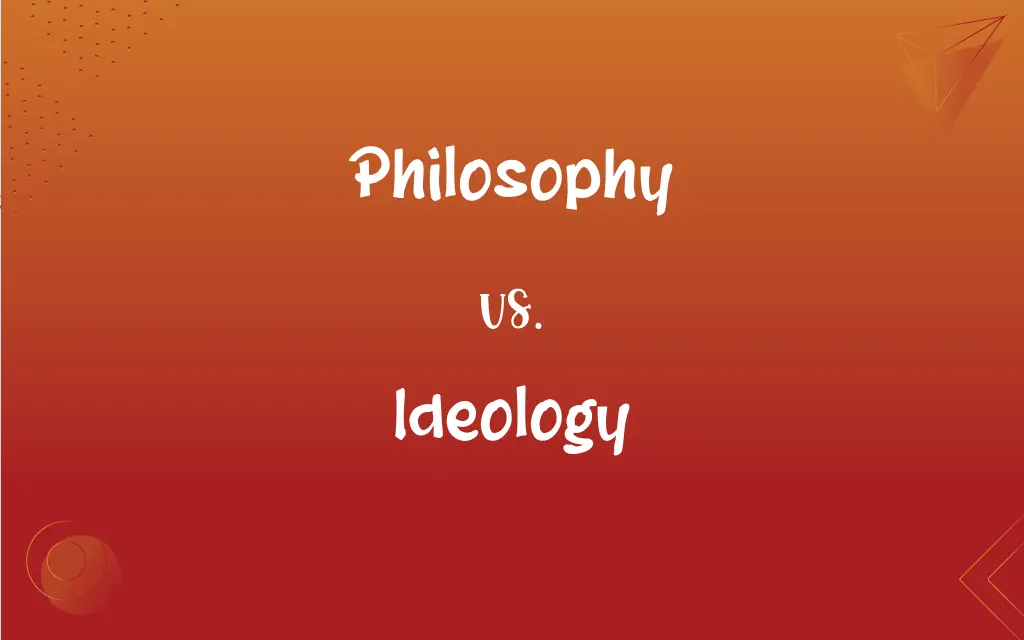Philosophy vs. Ideology: What's the Difference?
Edited by Janet White || By Harlon Moss || Published on November 28, 2023
Philosophy is the study of fundamental nature of knowledge, reality, and existence, while ideology is a system of ideas and ideals forming the basis of economic or political theory and policy.

Key Differences
Philosophy is an academic discipline that explores fundamental questions about existence, knowledge, values, reason, mind, and language. Ideology refers to a set of beliefs or principles that form the basis of a political, economic, or other system.
Philosophical inquiry is characterized by critical thinking and logical argumentation, seeking to understand the nature of reality and human existence. Ideology, in contrast, often entails a prescribed set of ideas that guide or influence social policy and political strategy.
Philosophy is broad and can encompass various schools of thought, including metaphysics, ethics, and epistemology, without necessarily advocating for a specific course of action. Ideology is more action-oriented, typically underpinning political movements or social agendas.
While philosophy encourages open-ended exploration and questioning, ideology tends to promote a particular viewpoint or doctrine, often with the aim of persuading or mobilizing others.
The goal of philosophy is often to seek wisdom and understanding, while ideology aims to implement specific ideas in practical, often political, contexts.
ADVERTISEMENT
Comparison Chart
Definition
The study of fundamental questions about existence, knowledge, values, and reason.
A system of ideas and ideals, especially one forming the basis of economic or political theory and policy.
Purpose
Seeks understanding and wisdom.
Aims to implement specific ideas in practical contexts.
Approach
Characterized by critical thinking and logical argumentation.
Often prescribes a specific viewpoint or doctrine.
Scope
Broad and inclusive of various schools of thought.
More specific, typically tied to political or social agendas.
Orientation
Exploratory and open-ended.
Action-oriented and often persuasive.
ADVERTISEMENT
Philosophy and Ideology Definitions
Philosophy
A particular system of philosophical thought.
The philosophy of existentialism explores human freedom and responsibility.
Ideology
A set of beliefs characteristic of a social group or individual.
His ideology was shaped by his upbringing and cultural background.
Philosophy
The study of the fundamental nature of knowledge, reality, and existence.
His philosophy on life was to live in the moment.
Ideology
A manner or the content of thinking characteristic of an individual, group, or culture.
The political party's ideology focuses on social equality and environmental responsibility.
Philosophy
A theory or attitude that acts as a guiding principle for behavior.
Her philosophy of kindness first influences how she runs her business.
Ideology
The integrated assertions, theories, and aims that constitute a sociopolitical program.
The revolutionary's ideology was driven by a desire for political reform.
Philosophy
The study of the theoretical basis of a particular branch of knowledge or experience.
His interest in the philosophy of science led him to study physics.
Ideology
A system of ideas and ideals that form the basis of economic or political theory and policy.
The ideology of capitalism emphasizes free market and private ownership.
Philosophy
A set of beliefs or values that guides an individual or group.
The company's philosophy focuses on customer satisfaction.
Ideology
A systematic body of concepts, especially those of a particular group or political party.
Her research focuses on the ideology of the feminist movement.
Philosophy
The study of the nature, causes, or principles of reality, knowledge, or values, based on logical reasoning.
Ideology
A set of doctrines or beliefs that are shared by the members of a social group or that form the basis of a political, economic, or other system.
Philosophy
A system of thought based on or involving such study
The philosophy of Hume.
Ideology
Doctrine, philosophy, body of beliefs or principles belonging to an individual or group.
A dictatorship bans things, that do not conform to its ideology, to secure its reign.
Philosophy
The study of the theoretical underpinnings of a particular field or discipline
The philosophy of history.
Ideology
(uncountable) The study of the origin and nature of ideas.
Ideology
The science of ideas.
Ideology
A theory of the origin of ideas which derives them exclusively from sensation.
Ideology
A set or system of theories and beliefs held by an individual or group, especially about sociopolitical goals and methods to attain them; in common usage, ideology is such a set of beliefs so strongly held by their adherents as to cause them to ignore evidence against such beliefs, and thus fall into error - in this sense it is viewed as a negative trait; contrasted to pragmatism, and distinct from idealism.
Ideology
An orientation that characterizes the thinking of a group or nation
Ideology
Imaginary or visionary theorization
FAQs
What is ideology?
Ideology is a system of ideas and ideals, particularly in politics, that constitutes a comprehensive vision or way of looking at things.
Are ideologies always political?
While often political, ideologies can also be cultural, economic, or social.
What role does ethics play in philosophy?
Ethics, a branch of philosophy, deals with questions of morality and human conduct.
What is a philosophical argument?
A philosophical argument is a reasoned discourse aiming to persuade through logical reasoning and evidence.
What is philosophy?
Philosophy is the study of general and fundamental questions about existence, knowledge, values, reason, and language.
What is the main focus of political philosophy?
Political philosophy focuses on concepts such as justice, authority, liberty, and the role of governments.
Can philosophy influence ideology?
Yes, philosophical ideas can shape and influence ideologies.
How is philosophy different from religion?
Philosophy is based on rational argument and inquiry, while religion often involves faith and spiritual belief.
Do philosophers follow specific ideologies?
Philosophers may subscribe to certain ideologies, but philosophy as a discipline encourages open inquiry and skepticism.
How does ideology impact society?
Ideology can greatly influence social structures, political systems, and cultural norms.
Is there a difference between personal beliefs and ideologies?
Personal beliefs are individual convictions, while ideologies are more structured systems of beliefs shared by groups.
Is ideology a type of philosophy?
Ideology can be influenced by philosophical thought but is more focused on practical application in social or political realms.
Can ideologies change over time?
Yes, ideologies can evolve and change as societies and cultures develop.
Are all ideologies based on philosophical principles?
Many ideologies have philosophical underpinnings, but some may also be based on economic theories, cultural beliefs, or political strategies.
How do philosophers analyze concepts?
Philosophers often use critical thinking, logical analysis, and argumentation to explore and understand concepts.
Can ideologies be harmful?
Yes, certain ideologies can lead to harmful or destructive actions and policies.
Can philosophy and ideology coexist?
Yes, philosophical thought can coexist with ideological beliefs, and they often influence each other.
What is metaphysics in philosophy?
Metaphysics is a branch of philosophy that explores the nature of reality, existence, and the universe.
Do ideologies always seek to inspire action?
While not always, many ideologies are action-oriented, aiming to inspire or justify certain behaviors or policies.
Can one have a personal ideology?
Yes, individuals can have personal ideologies that guide their views and actions.
About Author
Written by
Harlon MossHarlon is a seasoned quality moderator and accomplished content writer for Difference Wiki. An alumnus of the prestigious University of California, he earned his degree in Computer Science. Leveraging his academic background, Harlon brings a meticulous and informed perspective to his work, ensuring content accuracy and excellence.
Edited by
Janet WhiteJanet White has been an esteemed writer and blogger for Difference Wiki. Holding a Master's degree in Science and Medical Journalism from the prestigious Boston University, she has consistently demonstrated her expertise and passion for her field. When she's not immersed in her work, Janet relishes her time exercising, delving into a good book, and cherishing moments with friends and family.






































































